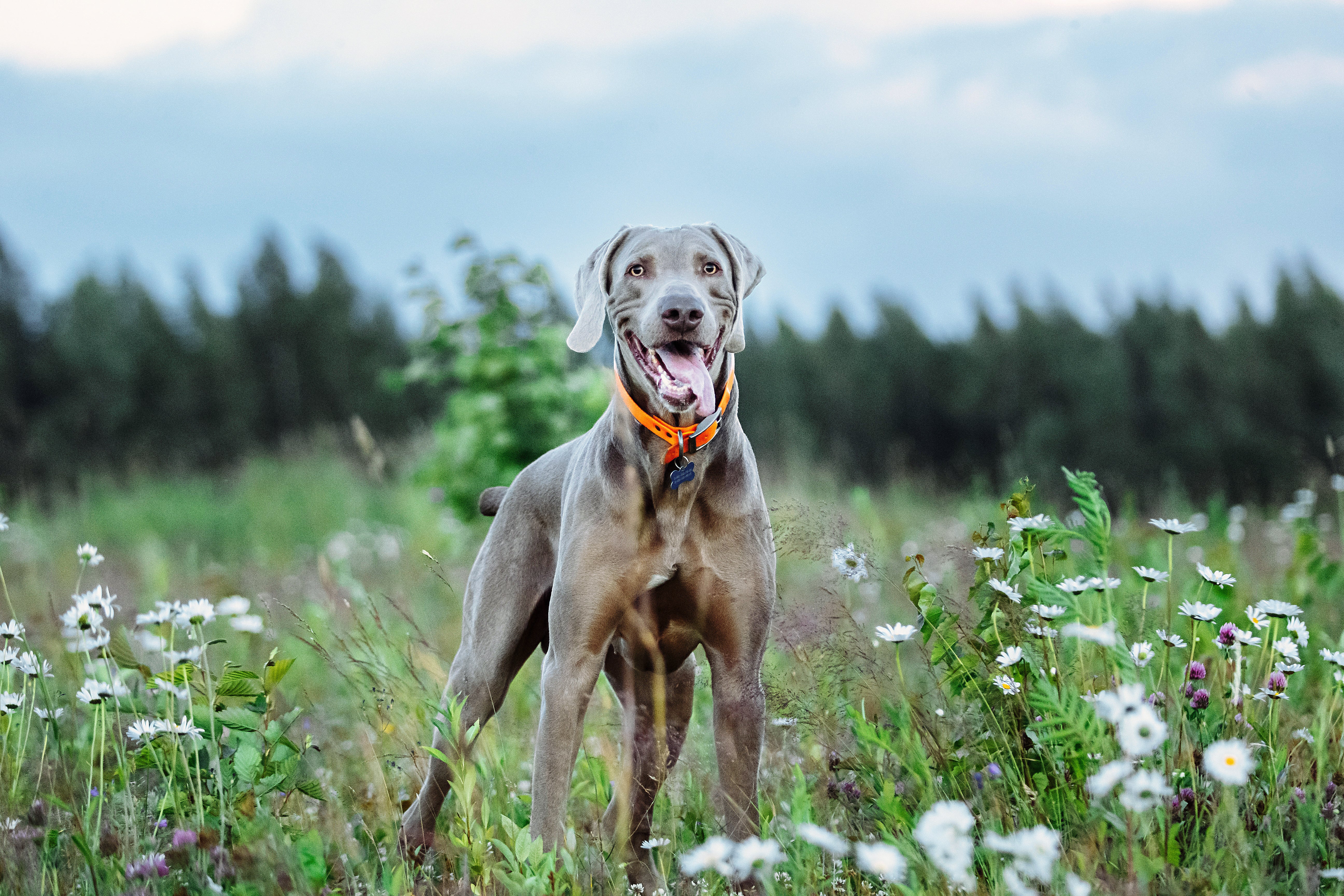Weimaraner
The Weimaraner is known for its athletic prowess and elegance. Despite their large size, they move gracefully and possess impressive speed, stamina, and endurance. While the short-haired coat in a unique silver-gray color is the most popular, there is also a less common long-haired variety. They boast noble-looking features, with a kind expression balanced by a watchful gaze.
Breed characteristics carousel
Learn More
Need to Know
- Suitable for owners with some experience
- Extra training required
- Generally healthy breed
- Enjoys vigorous walks
- Large dog
- Some drool
- Requires regular grooming
- Quiet dog
- Welcomes everyone happily
- Generally friendly with other dogs
- May need additional training to live with other pets
- May need additional supervision to live with children
- Needs a large yard, either in suburban or rural areas
- Can be left alone occasionally with training
- AKC Registered Breed

Personality
Weimaraners are balls of large energy with friendly and bold personalities. They crave exercise and love to run, hike, or join you in any outdoor activity. They can become frustrated and destructive without an outlet for their boundless spirit. While friendly and eager to please, these silver dogs can also be stubborn and require consistent training.
Ideally suited for active families without small children, Weimaraners thrive on camaraderie with their trusted humans and are known for being loyal, fun-loving companions. Their intelligence and alertness also make them excellent watchdogs. However, their strong personalities and need for training might not be ideal for first-time dog owners.
Nicknamed the "Gray Ghost" for their signature coat color, the Weimaraner’s origin can be traced back to approximately 1810 when Grand Duke Karl August of Weimar was believed to have developed the breed by crossing German Pointers, French Hounds, and Bloodhounds. Weimaraners remained prized possessions in Germany for over a century and were brought to the U.S. just before World War II.
Active individuals with an adventurous spirit make ideal Weimaraner companions. Their playful personalities can be a source of endless amusement (and perhaps a little mischief), so a sense of humor will get you far as an owner too. These energetic dogs require ample time for exercise and training, so any stimulating activity that challenges their minds and bodies will be a welcome addition to their routine. Weimaraners thrive in homes with older children or adults-only environments where they can keep up with their high energy levels and where small children don’t divert attention.
Weimaraners are athletes with an exercise schedule to match. Daily walks are a must, but to truly thrive they require activities that challenge their seemingly endless energy. Think running, fetching, swimming, or agility training—anything that gets them moving freely and expending that steam. A tired Weimaraner is a happy Weimaraner, less likely to exhibit destructive behaviors out of boredom.
Weimaraners are large, energetic dogs who need a fenced-in yard in a suburban or rural area with plenty of space to zoom around and exhaust themselves.
While the dog’s energy might seem endless, its grooming needs are simple. The big grey dog’s short coat requires minimal brushing with a bristle brush or hound mitt to remove loose hair and maintain a healthy sheen. Regular nail trims are crucial to prevent discomfort and potential injury. Aim for a length that just avoids clicking on hard surfaces. While their coat repels dirt remarkably well, a Weimareaner’s adorably floppy ears require regular checks for moisture and potential infections.
Weimaraners are highly intelligent dogs, which can be a double-edged sword when it comes to training. They pick up commands quickly, but that applies to both desired and undesired behaviors. Consistent, positive reinforcement training is crucial to channel their intelligence.
They operate on a "what's in it for me?" basis, so get creative and make training sessions fun and rewarding. While some sources portray them as stubborn, their eagerness to please shines through with the right approach. Once engaged, Weimaraners thrive on mental challenges—agility training being a perfect example.
While Weimaraners are known for their friendly and playful personalities, their energy levels can overwhelm young children. These energetic pups are like furry bundles of joy, but their bouncing enthusiasm might translate to accidental bumps and excited play that's too rough for little ones. However, in a household with older children who can keep up with their playful spirit, Weimaraners can be fantastic companions. They'll happily join in on games of fetch and adventures in the park, forming a strong bond with their active family.
The cost of a Weimaraner from a breeder is significantly more than the cost of adopting one from a local shelter or rescue. The adoption fee usually covers additional items such as spaying or neutering, vaccines, and microchipping.

Learn more about feeding and caring for your Weimaraner on Purina.
Did You Know?
- The Weimaraner's name comes from Grand Duke Karl August of Weimar, whose court is credited with founding the breed.
- Nicknamed the "Gray Ghost" for its unique coat color, the Weimaraner began as a specialized pointing dog but later expanded its skills to become a versatile gundog capable of various hunting tasks.
- The Weimaraner unexpectedly found fame thanks to American photographer William Wegman, who depicts the breed in his pictures of his dogs usually dressed in human clothes.

